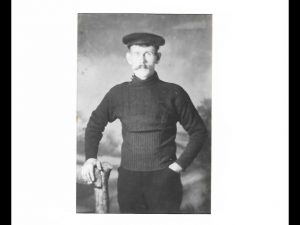Rev Alasdair Macleod
The article below was published in the December 2018/January 2019 issue of the Rudhach, the local magazine for Point district. As a paragraph from it has attracted some media attention, it seems sensible to make the whole article available for those who would like to understand what was said in its original context. As any fair reading of the text will establish, I am not suggesting for a moment that the victims of tragedies are any worse sinners than anyone else. The Bible teaches that “All have sinned and come short of the glory of God” (Romans 3:23). It is a sad reflection on our society that there is alleged “offence” at this message. I wonder if it is the “offence” (Galatians 5:11) of the Gospel itself.
One hundred years on, the scale of the Iolaire disaster still horrifies us. On that terrible night of 31 December 1918, more than two hundred men drowned. Most of them were returning from active service in the First World War to their homes in Lewis and Harris. Their families, waiting and longing to see them again, woke on the morning of New Year’s Day 1919 to the terrible news that their ship had foundered. Sailing in darkness, in stormy weather, the vessel hit the rocks at Holm, and sank with most of her passengers still on board.
After living through the horror of the Great War, the slaughter of the trenches, the warfare of attrition that had dragged on year after year, having survived the naval convoys that kept Britain’s supply lines open, the gas attacks, the early battles of aircraft, tanks, and machine guns, and the constant shelling, the young veterans perished just yards from the shore of Lewis. Families across the island learned that their loved ones had been lost on a peacetime voyage from Kyle of Lochalsh to Stornoway.
The disaster left a legacy of pain that would be hard to understand for someone unfamiliar with the closeness of Lewis communities. It took until 1958 for the island even to acknowledge the tragedy by erecting a memorial at the site at Holm. One hundred years later, we can at least commemorate the loss of the Iolaire, and remember the men who died on her.
 An uncle of my grandfather was on the ship, Donald Macleod, Domhnall Murchaidh ‘Rupert’, later of 8 Eagleton (pictured). Unlike most Lewismen of his generation, Donald had learned to swim, and as the vessel was sinking, he prepared to dive into the stormy waters. Another man, a native of Carloway, seeing him about to leave the ship, approached him, and told him that he could not swim. Knowing that he was going to die, the man asked Donald to carry his gold watch to give to his wife.
An uncle of my grandfather was on the ship, Donald Macleod, Domhnall Murchaidh ‘Rupert’, later of 8 Eagleton (pictured). Unlike most Lewismen of his generation, Donald had learned to swim, and as the vessel was sinking, he prepared to dive into the stormy waters. Another man, a native of Carloway, seeing him about to leave the ship, approached him, and told him that he could not swim. Knowing that he was going to die, the man asked Donald to carry his gold watch to give to his wife.
Donald took pity on him, and told him to get on his back, and to hold on tight. Together, they jumped into the water, and Donald swam for the shore. Somehow, in the darkness, in the freezing water, amidst the violence of the waves, with the weight of the man on his back, he made it to land. The man from Carloway told Donald he could never repay him for what he had done; he took out his most prized possession, the gold watch, and told Donald he wanted him to have it.
What would your life be worth? In a sense all of us are on a sinking ship. We are all dying – sooner or later – and after death comes the judgment of God. Judgment is often compared to flood waters in Scripture, and the Lord’s people appeal for deliverance: ‘Save me, O God; for the waters are come in unto my soul’ (Psa 69:1).
We do not deserve to escape judgment; we have no right to expect deliverance. We have sinned continually and repeatedly against God, and earned His wrath. Tragedies like the loss of the Iolaire are nothing less than we deserve as sinners against a Holy God. We have no excuse, no defence, no answer to the judgment of God.
The marvel is that there is One who is strong, and mighty to save. We cannot save ourselves, but we can cast ourselves upon the mercy of another: ‘God will redeem my soul from the power of the grave: for he shall receive me’ (Psa 49:15). Christ has endured the waters of judgment, he went down into the depths, experienced all that judgment could bring against Him: the innocent Man died for the guilty, and yet He rose again. Today He lives, as the One triumphant over death and over the grave (1 Cor 15:57). His offer is everlasting life to those who will call upon Him.
Have you put your trust in Christ? Is He your Rock, your Help, your Strength, your Hope of salvation? You cannot do it yourself. But His power is sufficient. Will you depend on Him alone, cling to Him in this world, and give to Him your best, as one who expects to live with Him in eternity to come?


Leave a Reply